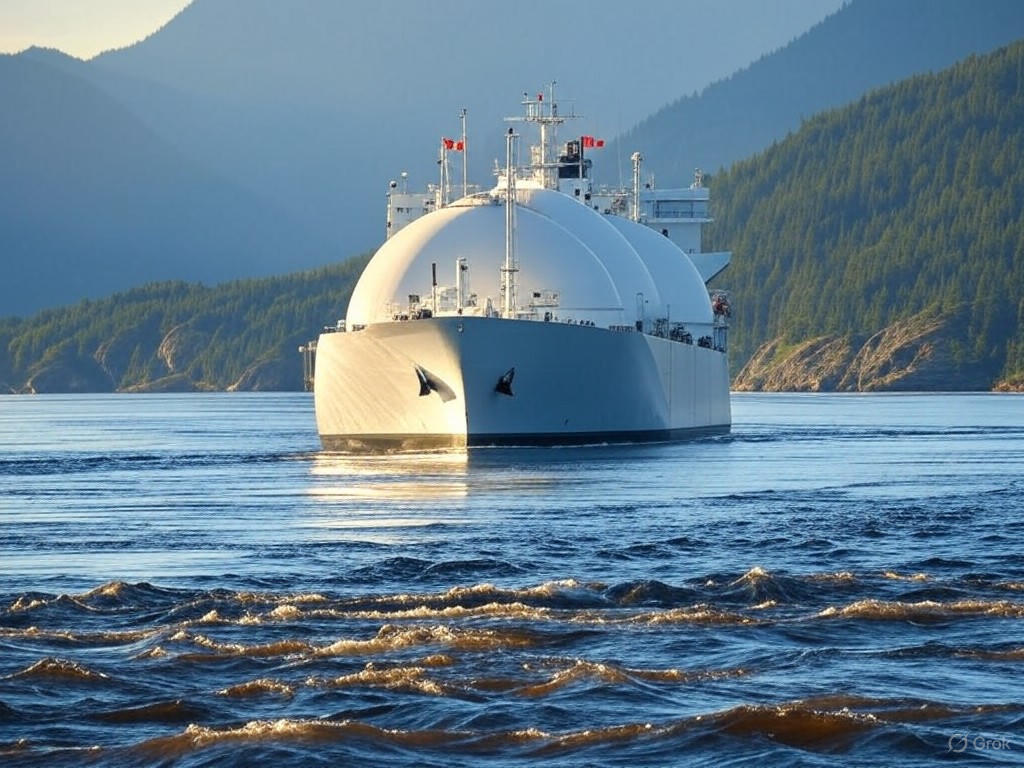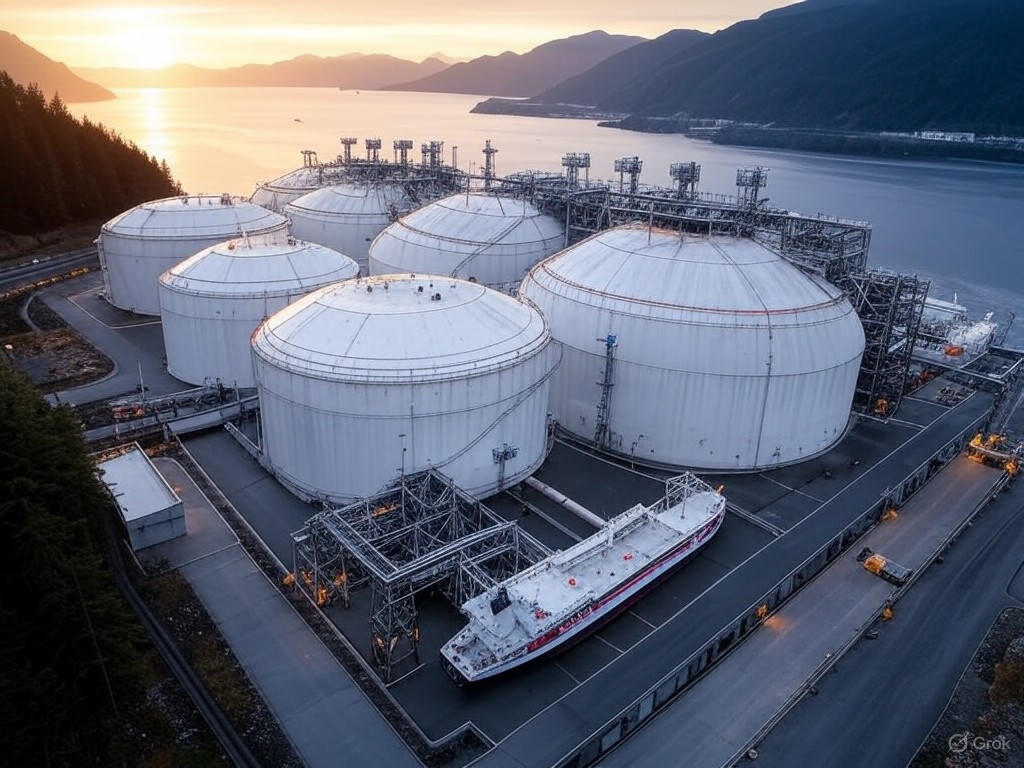BC’s LNG Exports: A Global Trade War Countermeasure
In an era of escalating global trade tensions, where tariffs and sanctions threaten to upend supply chains, British Columbia emerges as a beacon of stability in the energy sector. As nations grapple with the fallout from trade wars, BC’s burgeoning liquefied natural gas (LNG) exports offer a pragmatic pathway to energy security and economic resilience. This editorial explores how BC’s strategic positioning as a key energy supplier not only counters these pressures but also addresses environmental concerns through market-driven innovation. Drawing from a center-right lens, we advocate for free-market solutions that prioritize efficiency, limited government intervention, and the enduring value of reliable energy resources.
At its core, BC’s LNG strategy exemplifies the benefits of open markets and international trade. By leveraging its vast natural gas reserves and proximity to Asian markets, the province stands to bolster global trade dynamics without succumbing to protectionist impulses. Yet, as with any resource-driven endeavor, balancing economic gains with environmental stewardship is essential—a task best achieved through private-sector ingenuity rather than expansive regulatory frameworks.
The Geopolitical Chessboard: How LNG Exports Counter Trade War Pressures
Global trade wars, exemplified by recent U.S.-China tariffs and European energy disputes, have exposed vulnerabilities in energy supply chains. Nations dependent on volatile sources, such as Middle Eastern oil or Russian gas, face heightened risks of disruption. Enter British Columbia, where LNG exports provide a counterbalance. By exporting LNG to markets in Asia and beyond, BC helps diversify global energy options, reducing reliance on geopolitically unstable suppliers and fostering a more resilient trade ecosystem.
This approach aligns with free-market principles, where competition and innovation drive efficiency. BC’s LNG projects, like the Coastal GasLink pipeline and the upcoming LNG Canada facility, represent investments totaling billions of dollars, primarily from private entities Wall Street Journal. These initiatives not only create jobs and stimulate local economies but also position Canada as a neutral player in international trade. Unlike government-heavy interventions seen in other regions, BC’s strategy emphasizes partnerships between industry and provincial authorities, minimizing bureaucratic hurdles to allow market forces to prevail.
Yet, the true test lies in navigating trade war dynamics. For instance, as the U.S. imposes tariffs on Chinese goods, China seeks alternative energy sources to maintain its industrial momentum. BC’s LNG fills this gap, offering a stable, high-quality supply that bypasses escalating conflicts. According to industry analyses, this diversification could mitigate the broader impacts of trade wars by stabilizing prices and ensuring energy availability Energy Intelligence Group. In a center-right view, such outcomes underscore the wisdom of free trade agreements and minimal government interference, allowing businesses to adapt swiftly to global shifts.

An LNG tanker sets sail from Kitimat, British Columbia, symbolizing the province's role in securing global energy supplies amid trade uncertainties.
Analyzing the Economic and Environmental Imperatives
To fully appreciate BC’s LNG trade strategy, we must examine its economic underpinnings and environmental considerations. Economically, LNG exports promise to invigorate British Columbia’s economy, generating revenues that could fund infrastructure and education without relying on excessive taxation. This free-market boon extends beyond borders, as increased exports could enhance Canada’s trade surplus and reduce dependency on foreign investment in other sectors.
However, environmental concerns loom large. Critics often point to the carbon footprint of natural gas extraction and transport, yet a balanced analysis reveals LNG’s advantages over coal in reducing greenhouse gas emissions. BC’s LNG is produced with relatively cleaner methods, including methane capture technologies, which align with traditional values of stewardship and innovation Natural Gas World. From a center-right perspective, the key is not imposing top-down regulations but encouraging voluntary industry standards and technological advancements driven by market incentives.
Evidence from recent projects supports this view. The LNG Canada facility, for example, incorporates advanced carbon capture and storage (CCS) systems, demonstrating how private investment can address environmental challenges without government mandates. A study by the International Energy Agency highlights that LNG could displace coal in power generation, potentially cutting global CO2 emissions by up to 50% in key markets International Energy Agency. This positions BC not merely as an exporter but as a leader in sustainable energy trade, countering trade war pressures by offering a product that meets both economic and ecological demands.
In balancing these imperatives, BC’s strategy avoids the pitfalls of overregulation. Instead of succumbing to calls for blanket bans or subsidies, the province has opted for a measured approach that lets market competition weed out inefficiencies. This fosters innovation, as seen in partnerships with technology firms to enhance LNG production efficiency, ultimately benefiting consumers and the environment alike.

An aerial perspective of the LNG Canada facility in Kitimat, showcasing modern infrastructure that balances energy production with environmental safeguards.
Evidence and Implications: A Path Forward in Uncertain Times
The evidence for BC’s LNG strategy as a trade war antidote is compelling. Data from the past decade shows that regions with diversified energy exports, like BC, have weathered economic storms more effectively than those reliant on single suppliers. For instance, during the 2018 U.S.-China trade war, countries with access to Canadian LNG experienced less volatility in energy prices Petroleum Economist. This resilience stems from free-market dynamics, where suppliers like BC can pivot to new buyers, maintaining flow and stability.
Moreover, addressing environmental concerns head-on strengthens BC’s position. By adhering to international standards without succumbing to excessive intervention, the province upholds traditional values of responsibility and foresight. A recent report from the Fraser Institute, a proponent of limited government, argues that such strategies could add billions to Canada’s GDP while minimizing ecological risks Fraser Institute. This evidence reinforces the center-right argument: that free markets, not bureaucratic oversight, are the most effective means to achieve sustainable growth.
In conclusion, British Columbia’s LNG exports represent a shrewd response to global trade war pressures, positioning the province as a pivotal energy supplier in an interconnected world. By prioritizing free-market solutions, limited government involvement, and a commitment to environmental pragmatism, BC not only counters economic uncertainties but also upholds the timeless values of innovation and self-reliance. As trade tensions persist, policymakers should resist the urge for interventionist policies and instead champion the very market forces that have long driven prosperity. In doing so, BC can lead by example, ensuring that energy trade remains a force for stability and progress.

